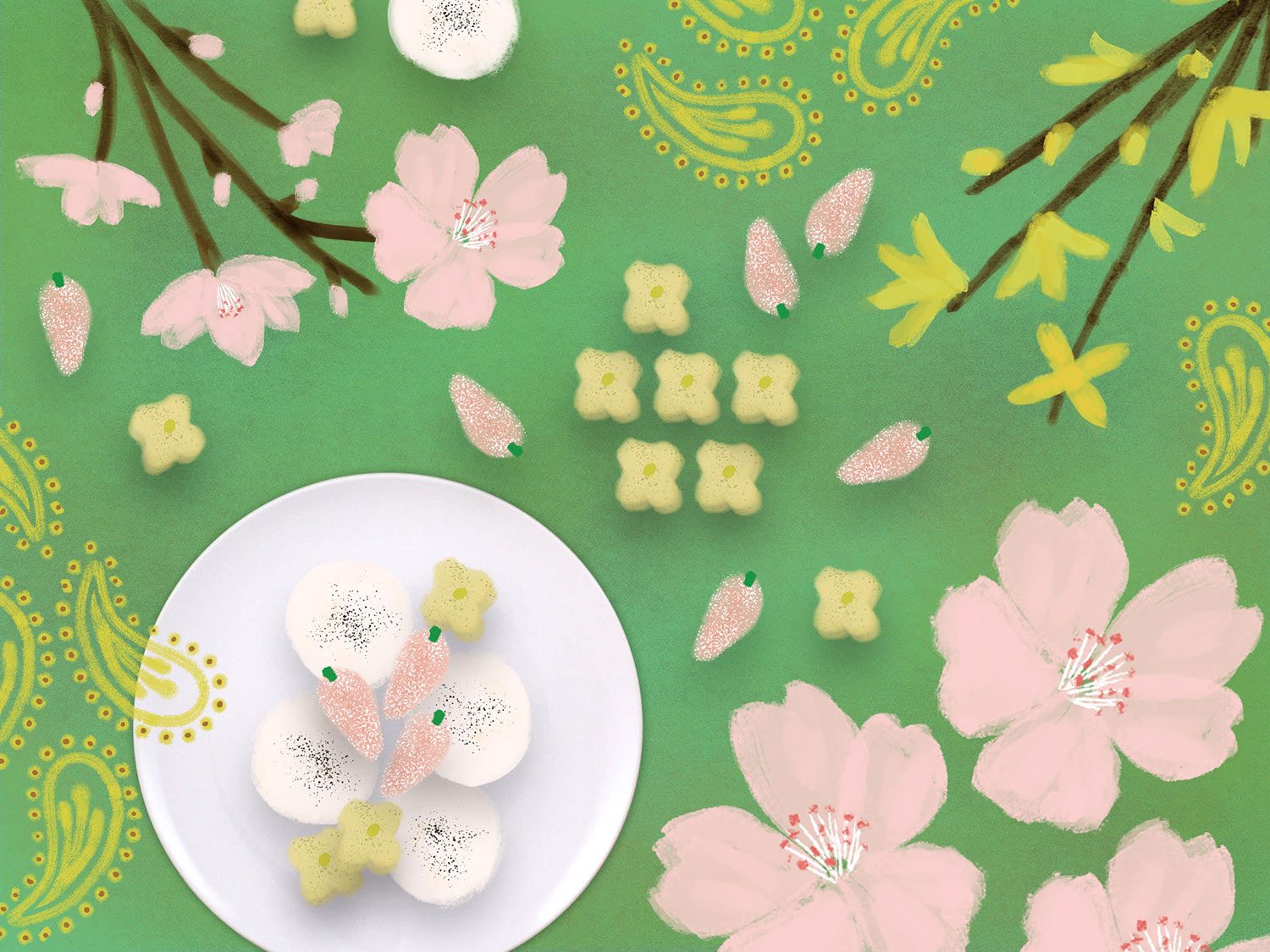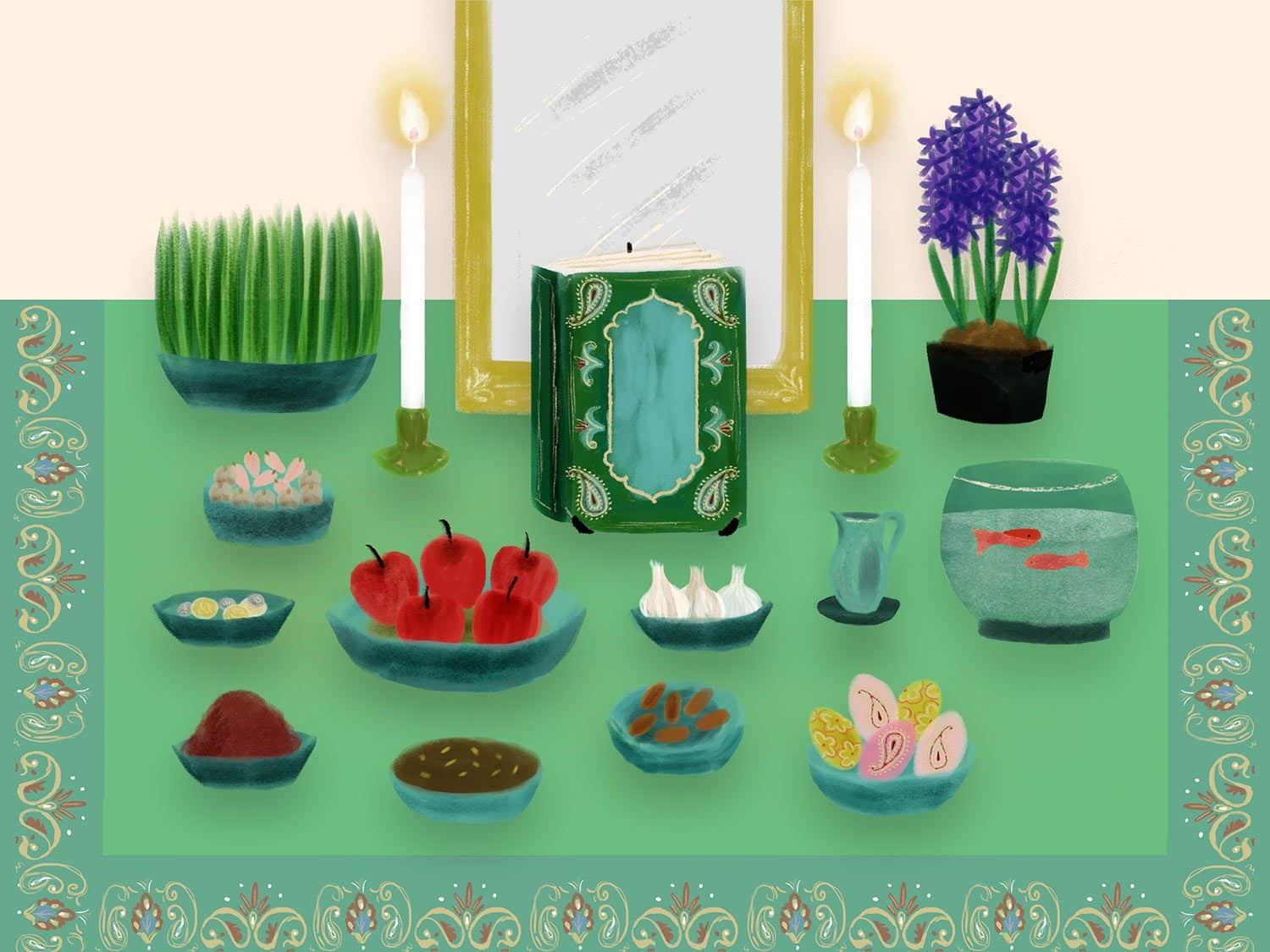
[Illustrations: Misha Zadeh]
I grew up without a sense of abundance, in pretty much everything except maybe imagination.
We were lower-class Iranians—a less visible phenomenon in our part of the US in that era. We were refugees on political asylum, from war as much as revolution, and we lived in a part of Los Angeles with few Iranians, many lives away from the very conspicuous Tehrangeleno elite. My brother and I shared a small bedroom in a small apartment in the undesirable part of town—the apartment district of mid-century stuccos, called “dingbat buildings” all over the Sun Belt—and my parents struggled with putting food on our plates. My mother still managed Persian dishes, but they were simple, and always served alongside whatever else was cheapest in America: pasta, salads with dressings made primarily of mayo and ketchup, Hostess snacks, sugary cereal, soda. I remember thinking we didn’t have enough, and that was just my lot in life.
I was cognizant of the fact that we had left abundance behind, of course; that in our native Iran, we’d had a lot. Not to mention lavishness just felt very Iranian. My father would remind us that we came from a great empire as he’d spread cheap supermarket caviar—a rare indulgence, even though it was the kind of terrible stuff that came in a jumbo jam jar for about the same price as jam—on Wonder Bread. My parents had left Iran at a time when they were two classes above what they became in suburban Los Angeles; the tragedy of supermarket caviar didn’t quite sink in for two kids who dreamed of Doritos and Ranch dressing, Hot Pockets and Pop-Tarts.
The only time of year when I felt the richness of the world they described, the Iran of the ‘70s and before, was during New Year. Ours, that is: Nowruz, the vernal equinox that marks a new year. American New Year was just an afterthought, as my parents were not partiers and we kids were too young to go out anywhere; all of us just huddled by the TV to watch Dick Clark and pray the drunk neighbors wouldn’t shoot guns from their rickety balconies. But Persian New Year included our whole family. Preparation started weeks before, and official celebration went on for two weeks after. It was a major affair and, sadly, one I could not share with school friends. There was zero acknowledgment of anything Iran-related in my school, especially in the ‘80s, when Iran was still freshly a dirty word.
But at home, our sad, musty beige and brown apartment would transform into a green and gold paradise. The haft-sin—the traditional table setting, consisting of seven items that all start with the Farsi s, or sin—was my mother’s pride and joy. All of it was there: sabzeh, or sprouts, symbolizing rebirth; samanu, or sweet wheat germ pudding, for power; senjed, or oleaster fruit, for wisdom; seer, or garlic, for wellness; seeb, or apples, symbolizing beauty; somaq, or sumac fruit, for patience; and serkeh, vinegar, representing longevity. Plus, there were mirrors, goldfish, candles, hyacinths, painted eggs, various candies, a copy of the Persian Book of Kings or the Koran or both. We kids knew we’d get haircuts and new clothes (it was auspicious to be in brand-new things at the moment of the equinox) and maybe some money. And for weeks we’d get to eat great Persian pastries that my mother would either attempt herself or buy from the Persian grocery stores in the heart of Tehrangeles—usually both. Sweet poppy seed–sprinkled rice cookies, clover-shaped chickpea-flour cardamom cookies, thin and crispy raisin cookies, little baklava morsels, marzipan berries with pistachio stems. Sweets were everywhere, and with them the scent of rosewater and saffron. Nowruz had the heaviest perfume, an irresistible and irresistibly abundant sort of aura.
And then the meal, New Year’s dinner: the only time in my childhood when my mother cooked fish, usually a delicate white fish, with the traditional herb rice (sabzi polo, basmati with cilantro, parsley, and dill), and often with a side of kuku, a Persian spinach and egg frittata. There was something so shockingly healthy about it, so light, so vibrant—I remember feeling like I was glowing as I ate. It was all so green—as if you were actually eating spring itself.

Haft-sin.
And then the picnics! We’d drive another hour to Irvine in Orange County, where some of our cousins had settled, and which was, I noticed, full of other types of Iranians—more conservative ones, it seemed. My mother rose to the occasion, suddenly becoming the sort of person who had a picnic basket lined with pretty linens, Tupperware filled with eggplant dip and kabob and saffron rice, and those pastries again. I lived for the nougat candy gaz, which could crack your teeth, the elders warned, but I loved its danger. Festivity meant we were in the realm of luxury—wants, not needs—and I never wanted it to end.
Suddenly, the new clothes came in abundance, too. All year I’d dream of this store in a nearby town, called The Adorable Shop, which was full of pricey dresses and designer sportswear. I’d always beg for something from there for Christmas, and instead end up with knockoff Guess jeans. Christmas just never mattered to our parents, even though they lukewarmly participated for our sake, with a small plastic tree and drugstore stockings. But for Persian New Year, we’d get to go to The Adorable Shop, and I could pick out something from the sale section—usually some lacy monstrosity that didn’t fit quite right, but I’d leave feeling like a princess.
Everything about Nowruz made me feel so rich, like we had so much, like we had things to spare. My parents, even at their most destitute, always gave cash as alms, but they reminded me that Nowruz is a time especially meant for giving, donating, and helping others.
I remember one Nowruz—I must have been 12 or so—I was in the car, holding a tin of Nowruz cookies to share with my homeroom class. We passed by a bridge underpass, where the usual homeless people were camped out. At the red light, my mother dug into her wallet and complained she had no change. I saw her take out a $20 bill and eye it for a good long while. She handed it to me.
“I can have this?” I cried, excited. Twenty dollars was 10 times what I could realistically imagine back then.
She shook her head. “No, I’m going to drive around back here, and I want you to give it to one of those homeless guys.”
I almost groaned. It was not the first time my parents had pushed me into giving to poor people—part of it was training, but another part of it, I was sure, was their worry about their imperfect English.
“You should give the cookies, too,” my mother said.
This was abundance. We could give more than ever away, just this time of the year.
I nodded obediently, more because I had heard it brought you good luck to do good to others.
My mother pulled to the curb after doing another loop, and I slowly got out of the car, twenty in one hand, cookie tin in the other. I walked to the closest guy, an old, bearded white man, slumped outside a makeshift tent, dirt all over him.
“Here you go,” I said, handing him the money and the tin.
“Wow, what have we here?” he said. “Thank you, God bless you.”
I saw him pocket the money and peer into the tin, with its heavy, sweet aroma.
“It’s cookies,” I said, “of my culture. Iranian. It’s Persian New Year.” I was mumbling, trying to get myself to wish him a happy new year, as I know my mother would have wanted me to do, but that was all that came out.
What happened next I only half remember, but I recall his expression changing, his eyes narrowing, and I heard some words that I did not understand exactly, but knew to be insults, and very ugly ones at that.
Alms or not, we were from Iran.
In the car again, I was quiet. I didn’t tell my mother. I just let her say she was proud of me, and hid my eyes, hot with tears. I told myself giving was in itself a good thing; it didn’t matter what you got in return, even if it was something bad.
By the time I went to bed the final night of that New Year, I had put this incident behind me, revisiting it only occasionally many years later, when racism and xenophobia began to take all sorts of forms in my interior and exterior worlds. What, I wondered, helped me survive that? All I can think was that it was the feeling of abundance, of new beginnings, of beauty and luxury—a realm that transcended simple survival. Nowruz had preserved me in its benevolence, and it would return every year, just for a few weeks, a reminder that we are more than what we don’t have.
Source link